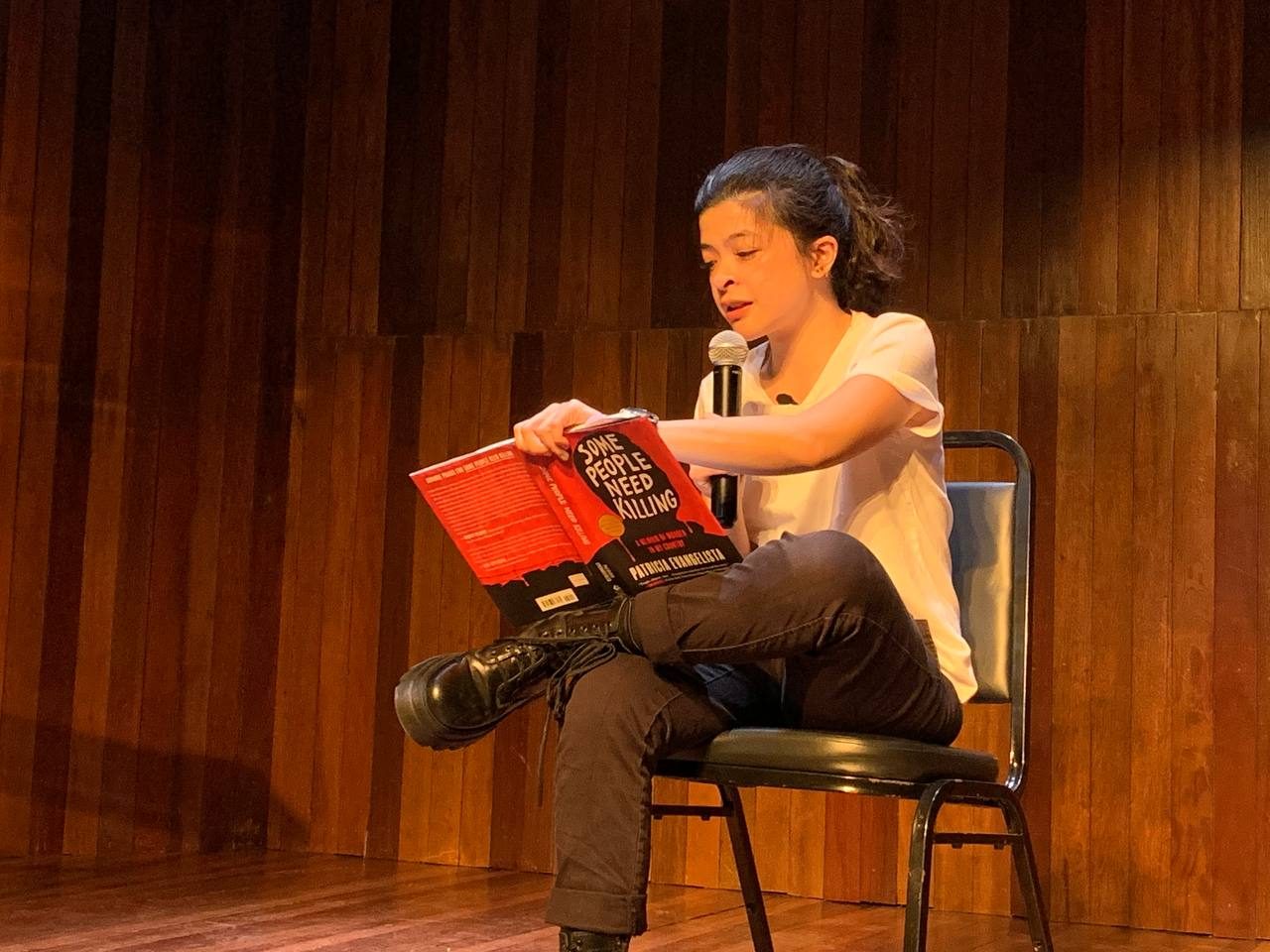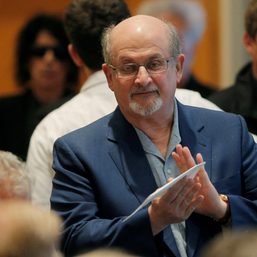SUMMARY
This is AI generated summarization, which may have errors. For context, always refer to the full article.

MANILA, Philippines – Journalist Patricia Evangelista continues to tell the harrowing stories of drug war victims. This time, she made a stop at her alma mater, University of the Philippines Diliman.
After her reunion with drug war widows in Payatas on April 8, Evangelista continued her tour for “Some People Need Killing: A Memoir of Murder in My Country” in Aldaba Hall on Thursday, April 11. Attendees, mainly from the UP community, filled the room. Evangelista also reunited with her former teachers from the UP College of Arts and Letters.
During her conversation with the audience, Evangelista said she was still in UP when she started working as a journalist and when the case of disappeared students Karen Empeño and Sherlyn Cadapan also caught the national attention. Empeño and Cadapan were among the thousands of documented cases of enforced disappearance in the Philippines.

Evangelista could not believe people could disappear like that. It was surreal for her because they were from the same college and existed in the same space.
“Hindi ko alam na ginagawa ‘yon ng gobyerno ko. Hindi ko rin alam na posible na mangyari ‘yon na lahat kami walang alam. And technically, by that point, media na ‘ko eh (I did not know our government was doing that. I also did not know that that could happen without us not knowing anything about it. And technically, by that point, I am already a media person),” the journalist-author said.
Since, according to her, she has no specialization other than speaking and doing her job as a journalist, Evangelista said her only contribution at the time was to be able to see and seek stories – things she learned while inside the campus.
“So, ‘yon ‘yong nakuha ko sa UP: natuto ako lumabas, makita, gumalaw. At nakita ko rin, ang iskolar ng bayan kasi, ang utang naman natin ay hindi sa gobyerno, ang utang natin sa bayan. So ang kailangan gawin malaman kung ano ‘yong bayan na ‘yon at ano ‘yong utang natin,” she explained.
(So that’s what I got from UP: I learned to go out, see, and act. And I also realized that we state scholars owe our country, not the government. So what we need to know is to determine what aspect we can help our country with and how to pay back.)
“So I think for all of us, we spend the rest of our lives trying to figure out what we owe, not to this university, but to the nation that shaped us.”
Years after graduating from UP with a degree, Evangelista joined Rappler as an investigative reporter, where she extensively covered former Rodrigo Duterte’s drug war that killed thousands of people. She spent years covering killings and talking to the grieving families of drug war victims.
She relied on her experience covering the horrifying state of human rights in the Philippines to create her groundbreaking book that received several recognitions from respected institutions. Evangelista’s book was named among the New York Times’ 10 Best Books of 2023, the New Yorker’s Best Books of 2023, and TIME Magazine’s 100 Must-Read Books of 2023.
‘Pay it forward’
On Thursday, Evangelista also announced the kickoff of her initiative “Ituloy ang Kuwento” (pass the word), which aims to provide free copies of her book to public libraries, community centers, human rights organizations, schools, and non-profit groups.
The program is in partnership with Fully Booked as a retail partner and Library Renewal Partnership and the Human Rights and People Empowerment Center as distribution partners. Library Renewal Partnership is a coalition dedicated to building libraries for community engagement, while the Human Rights and People Empowerment Center is composed of around 400 community partners who advocate for human rights.
Evangelista said they aim to reach 3,000 book donations by May 10. As of April 11, they already had 782 books.
“If you can, please consider supporting the initiative through buying copies that can be distributed to people that they might not reach. Copies will be bought at a discount rate from Fully Booked. And ‘pag bumili kayo ng kopya ng libro, ‘yong discount mag-a-apply din sa sariling libro ‘nyo (And if you buy a copy of the book, the discount will apply to your own book). Think of it as a pay it forward,” the author said.
“The book that you will buy that will not go to you will go into a pool of books that will be sent by our friends across the country to people who would like to read it,” she added.

How did drug war change her?
In a conversation with journalist Atom Araullo, Evangelista reflected on her experience covering Duterte’s drug war. Evangelista said the process of covering it changed her as she used to believe journalists “should stand in the background” and should speak in “the omniscient voice of a third person.”
“But as the war, as body followed body, followed body, and I understood where people were standing, I also understood I was a citizen and a journalist,” Evangelista said.
“We cover wars because we don’t think people should be slaughtered. We cover a murder because it is out of the ordinary. And suddenly we’re in a situation where all this is ordinary. So journalism becomes resistance. Did it change me? Yeah. I’m willing to say, I’m taking a stand that this is wrong. I didn’t know before this that there were people who believed sincerely that this was a grand thing,” she added.
Evangelista also reminded journalists not to promise anything to the victims they cover. She said reporters should tell people that the media’s job is to tell stories, and there’s no assurance that this can help attain justice or make people’s lives better.
“But it’s not in our power. It’s not in anyone’s power as journalists,” Evangelista said. “In fact, if you’re a journalist, and you believe that by your job you’re changing the world, you’re going to quit tomorrow. You have to negotiate your expectations. Our job is to keep a record. Just that. Keep the best possible record, and if the world changes, then that’s a good thing.”
Early this year, veteran journalist Carolyn Arguillas of MindaNews gifted Duterte a copy of Evangelista’s book. Evangelista said if Duterte read her book, she hoped the former president would respond to the questions she sent him. She said she’s eager to know the actual count of people Duterte said he had killed.
Evangelista also left a message for Duterte: “Sabi kasi niya, ano ba yung pagkasabi niya? (He said, what did he say?) ‘Frankly, are they human?’ What is your definition of a human being? If nothing else, I hope the book attempts to define what a human being is. Which is everyone. I hope he reads it and he sees the faces and he sees the people and he remembers their names. And I hope it matters to him that they’re lost. That’s all.” – Rappler.com
Add a comment
How does this make you feel?










There are no comments yet. Add your comment to start the conversation.